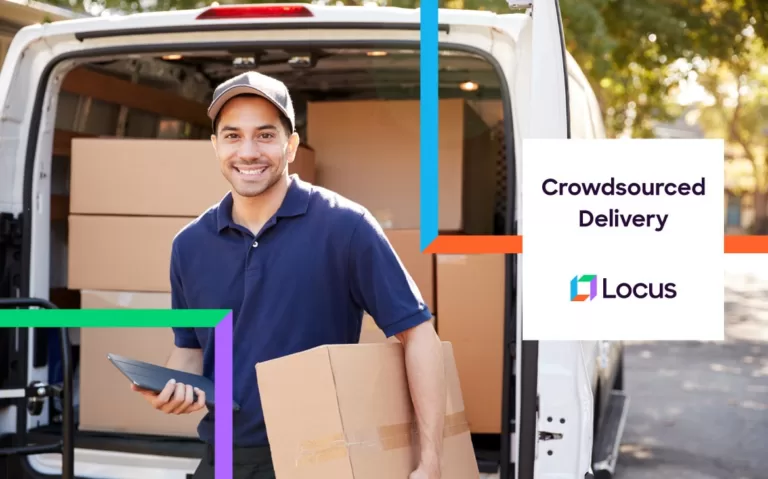Last Mile Delivery Optimization, Supply Chain Optimization
Electric Vehicles (EVs) — The Future of Last-Mile Deliveries in 2021 and Beyond
Feb 9, 2021
7 mins read
As convenience, delivery speed, and efficiency continue to define customer experience, there is a steady growth in the use of Electric Vehicles to carry out last-mile operations. EVs are eco-friendly and offer some hidden business gains to supply chain enterprises. Read on to catch up on this rising trend that is shaping up the future of last-mile deliveries across the globe.

Over the past few years, there has been a tremendous boom in the e-commerce industry. The COVID-19 pandemic has further escalated it, causing significant shifts in consumer buying behaviors and establishing online shopping as another new normal for all of us.
The bygone year also created a massive surge in demand for same-day and next-day home deliveries, dynamic on-demand services, and hyperlocal shopping. It is only fair to say that convenience is driving customer satisfaction, now more than ever. And as convenience takes the center stage, so does the demand for fast, efficient, and consistent last-mile operations.
Having said that, there has been a steep rise in the number of vehicles on road carrying out last-mile delivery operations. This has led to an increase in carbon emissions and greater fuel consumption. The growing demand for last-mile deliveries is expected to result in 36% more delivery vehicles in the top 100 global suburbs by 2030. This is also expected to increase carbon emissions up unless effective measures are taken.
For enterprises involved in the final mile race, whether it is retail, e-commerce, direct-to-consumer selling, third-party logistics, food, and grocery deliveries, or home services, good logistics is a true litmus test for success in the marketplace.
But at the same time, as socially responsible corporates, businesses also have a commitment towards the environment — to control the devastating impacts of logistical activities on the planet and build sustainable supply chains.
Many supply chain enterprises are therefore embracing greener logistics practices with the aim of reducing carbon footprint and minimizing the impact on the environment.
E-commerce giant Amazon plans to run on 100% renewable energy by 2030 and is working with Rivian Automotive Inc. to include 100,000 battery-electric delivery vans for its Prime deliveries. In August 2020, Walmart-owned Flipkart announced its commitment to transition to 100% adoption of electric vehicles by 2030, joining The Climate Group’s global electric mobility initiative, EV100. Walmart also aims to operate an entire fleet of all-electric vehicles powered with 100% renewable energy, to support their road to zero emissions by 2040.
Across Europe too, electric delivery vehicles are becoming a more common sight on inner-city roads. IKEA, for example, is aiming to have 25 percent of its last-mile deliveries made by electric vehicles by 2025. India’s top online grocery retailer, BigBasket has also begun to use electric bikes and three-wheelers for last-mile delivery, with an aim to ramp up its fleet of 800 EVs to 4,000-5,000 in the next two years.
Download WhitePaper on Last-Mile Delivery: Finding the Right Balance
Switching to Electric Vehicles in the Final-Mile: An Eco-Friendly Move
The adoption of EVs or electric vehicles for last-mile deliveries is perhaps one of the coolest trends towards implementing green logistics in supply chains. These electric vehicles run on electric motors, instead of internal-combustion engines that generate power by burning a mix of fuel and gases.
There are two types of EVs popularly used — All-Electric Vehicles (AEVs), which run solely on electricity, and Plug-in Hybrid Electric Vehicles (PHEVs), which have both an internal combustion engine and electric motor, running partially on fuel and electricity.
Either way, EVs are seen as an effective replacement for fuel-intensive automobiles, in order to address the issue of rising pollution, global warming, and depleting natural resources. Apart from being environmentally friendly, electric vehicles also offer supply chain enterprises with many other business benefits.
Business Benefits of Using Electric Vehicles (EVs) for Last-Mile Deliveries
Minimal fuel consumption
The logistics industry relies heavily on transportation, and that translates into excessive quantities of fuel consumption, throughout the supply chain journey. The U.S. used nearly nine billion barrels of petroleum in 2018, two-thirds of which went towards transportation. No petrol, CNG, or diesel is needed in a fully electric vehicle, and very little fuel is required even for a hybrid EV. By using electric vehicles for carrying out last-mile deliveries, supply chain enterprises can, therefore, minimize fuel consumption significantly.
Cost-efficient logistics
It goes without saying! Fuel consumption and logistics costs go hand in hand, so when you go all-electric with last-mile operations, it also reduces operating costs along with lesser fuel consumption. The operational cost of a conventional three-wheeler is 3.3 times higher than an electric three-wheeler. Over the life of the asset, it adds up to sizable cost savings. Also, with technological advancements, switching to an electric delivery fleet is no longer a huge monetary investment, as compared to a few years ago.
Convenient and easy to maintain
Electric vehicles are quite low maintenance. Just like a smartphone, electric vehicles can be connected to an external power supply in order to recharge. Once recharged, most EVs have a mileage of 80 to 100 miles and can last up to 12 hours. Electric vehicles also have fewer auto parts compared to regular vehicles — such as the engine, a radiator, pistons, spark plugs, fuel pumps, cooling systems, exhaust systems, and timing belts, which makes vehicle maintenance a lot more hassle-free. These vehicles only need a battery replacement or maintenance, once every couple of years. Research by automotive data experts KeeResources revealed that an electric car is at least 30% cheaper to service and maintain than an internal combustion-engined vehicle.
The Future of Last-Mile Belongs to EVs
Though the concept of electric vehicles has been around for a long time, lately it has drawn considerable interest among supply chain enterprises due to its efficiency and sustainability. But the big question is whether it is ideal for your business to adopt EVs in your last mile operations?
While all sorts of delivery businesses can easily implement an EV delivery fleet, it is most suited to businesses that perform last-mile deliveries within a fixed and limited radius — such as retail delivery, e-commerce, home service businesses, milk, groceries, or food delivery businesses, etc.
Electric vehicles are gradually gaining popularity in the final-mile game, and it is certainly a worthy investment to consider in 2021 and beyond. If you further want to optimize your supply chain above and beyond implementing EVs in your supply chain, smart route optimization powered by Artificial Intelligence can help in accurately planning delivery routes, day-to-day dispatches, while driving lesser miles and improving last-mile visibility for your business.
Locus offers best in class AI-enabled logistics solutions to optimize your last-mile delivery operations. Get in touch with our experts for a quick tour of our solutions.
Sources:
- https://yourstory.com/2020/11/indian-last-mile-delivery-market-electric
- https://www.energy.gov/eere/electricvehicles/electric-vehicle-benefits
- https://www.logisticsinsider.in/evs-the-future-of-last-mile-delivery/
- https://afdc.energy.gov/vehicles/how-do-all-electric-cars-work
- https://www.energy.gov/eere/electricvehicles/electric-vehicle-basics
- https://www.buyacar.co.uk/cars/economical-cars/electric-cars/650/cost-of-running-an-electric-car
- https://www.fleetowner.com/running-green/blue-fleets/article/21704289/amazon-to-add-100000-electric-vans-to-prime-fleet
- https://www.livemint.com/news/business-of-life/lastmile-delivery-opens-doors-for-adoption-of-electric-vehicles-11610901896423.html
- https://www.jll.co.in/en/trends-and-insights/cities/how-delivery-firms-are-making-the-last-mile-electric
- https://stories.flipkart.com/100-electric-mobility-by-2030-flipkart-drives-towards-sustainability-with-ev100/
- https://corporate.walmart.com/newsroom/2020/11/10/walmart-teams-up-with-cruise-to-pilot-all-electric-self-driving-delivery-powered-by-100-renewable-energy
![[Infographic] Electric Vehicles - The Future of Last-Mile Deliveries](https://locus.sh/assets/img/infographic/resources/should-you-consider-taking-the-ev-route-for-last-mile-logistics.jpg)
Infographic by Locus
Share this infographic by using this embed code:
<a href="https://blog.locus.sh/electric-vehicles-for-last-mile-deliveries/" target="_blank" style="text-align: center; display: block;"><img src="https://locus.sh/assets/img/infographic/resources/should-you-consider-taking-the-ev-route-for-last-mile-logistics.jpg" alt="[Infographic] Electric Vehicles - The Future of Last-Mile Deliveries" style="width:100%;height:auto;max-width:750px;margin:auto;"></a><br/>Infographic by <a href="https://locus.sh/">Locus</a>
Related Tags:

Last Mile Delivery Optimization
How Customer Expectations are Redefining B2B Logistics Businesses in 2021
The E-Commerce boom has influenced consumer behaviour like never before. Economics taught us that it was the price that drove demand. Now, we are learning how convenience drives demand even more. 2020 was a disruptive year in more ways than one, but remarkably disruptive in how it changed the way people buy and sell. The […]
Read more
Last Mile Delivery Optimization
Crowdsourced Delivery Is Changing the Last-Mile Delivery Game
Updated on: August 10, 2022 The movie or book series of Harry Potter has a separate fanbase for the spells casted in it. We used to imagine ourselves as Hogwarts students and repeat the spell used in it. One such spell used in Harry Potter and the Goblet of Fire was Accio. This spell Accio […]
Read moreMOST POPULAR
EDITOR’S PICKS
SUBSCRIBE TO OUR NEWSLETTER
Stay up to date with the latest marketing, sales, and service tips and news



Electric Vehicles (EVs) — The Future of Last-Mile Deliveries in 2021 and Beyond